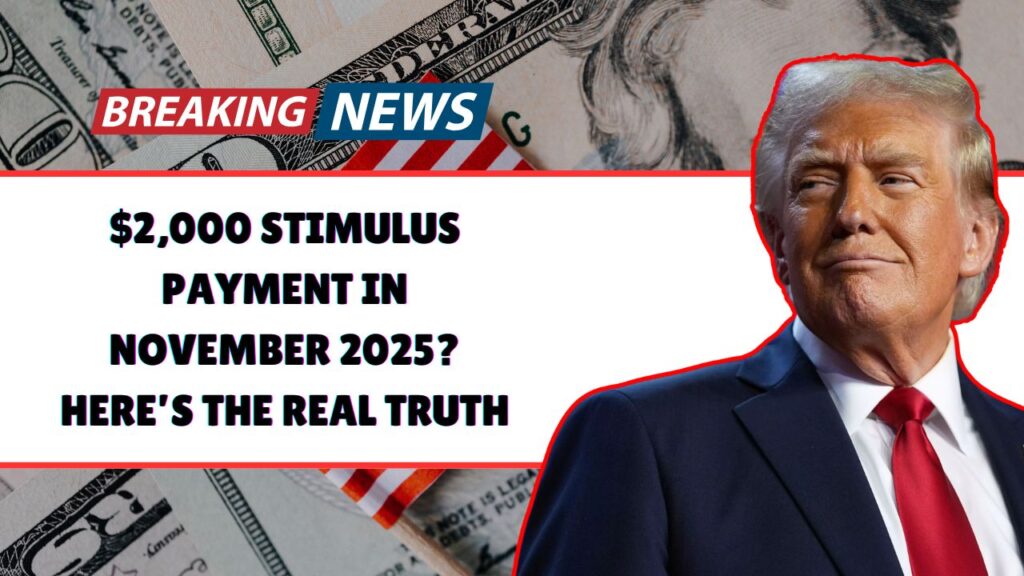Rumors about new government payments often spread quickly online, and this time, many people are talking about a possible stimulus payment in November 2025.
Some posts even mention a $2,000 tariff dividend or an IRS direct deposit relief payment. But before you start expecting money, here’s the real story behind these claims.
Federal Stimulus Payment – What’s True?
The last official federal stimulus payment was issued in 2021 under the American Rescue Plan Act. Since then, no new law has been passed to approve another nationwide payment.
The Internal Revenue Service (IRS) has also not announced any upcoming direct deposits for November 2025.
In 2024, the IRS automatically sent $1,400 payments to people who had not claimed the Recovery Rebate Credit on their 2021 tax returns.
Those payments were sent between December 2024 and January 2025 through direct deposit or paper checks. The final deadline to claim that credit was April 15, 2025, which has already passed.
Therefore, any messages about new stimulus checks this November are not true. Congress has not approved any additional payments, and the IRS has not confirmed any new programs.
Facts About Stimulus Payment
| Claim | Reality |
|---|---|
| New stimulus payment in November 2025 | False – no new law or IRS update |
| $1,400 Recovery Rebate Credit | Last payments were sent in early 2025 |
| $2,000 tariff dividend | Only a proposal – not approved yet |
| IRS contacting by text/email | Usually scams – IRS does not message this way |
The Tariff Dividend Proposal
Former President Donald Trump mentioned an idea called a “tariff dividend” in 2025. He suggested that money collected from tariffs (taxes on imported goods) could be used to pay $2,000 to most Americans, except for those with very high incomes.
Trump also said leftover funds could go toward reducing the national debt, which is over $37 trillion. The plan would mainly benefit middle- and low-income people, those earning $100,000 or less.
However, it’s important to note that this is only a proposal. It has not been approved by Congress, and no official process has started for these payments. At this point, it remains an idea, not a real relief program.
Watch Out for Scams
Whenever there’s news about possible government payments, scammers use it to trick people. Fake emails, text messages, or social media posts often claim that you can “register” to receive a payment or that you must “confirm your bank account.”
Here’s how to stay safe:
- The IRS never contacts people first through email, text, or social media.
- The IRS always starts with an official letter.
- Agents will not demand payment or threaten you.
- Never click on links that promise new stimulus checks.
If you are unsure, visit the official IRS website or talk to a verified tax professional. It’s better to double-check than lose your personal information.
Current IRS Warnings
The IRS has continued warning Americans about fake payment messages that ask for personal data. These scams often use real-looking logos or fake IRS letterheads. Remember, if someone claims you must “act now” or “verify your identity” to get money, it’s probably fake.
Many social media posts about $1,702 or $1,390 payments also turn out to be state-level programs like Alaska’s Permanent Fund Dividend or completely made-up stories.
What You Should Do
- Don’t rely on unconfirmed government payments.
- Stay alert for scams and always check official IRS communications.
- Keep your tax records updated to receive legitimate refunds or credits.
- If new relief programs are ever announced, major news outlets and IRS.gov will confirm it.
As of November 2025, there is no confirmed federal stimulus payment or $2,000 tariff dividend coming from the IRS or the government.
The last verified stimulus assistance was the $1,400 Recovery Rebate Credit, and any future payments would need new approval from Congress.
Stay alert, ignore rumors, and never share personal details with strangers promising “fast cash.” Always depend on official government updates before believing online claims.
FAQs
No, the IRS has not confirmed any new payments for November 2025. All current claims are false.
It’s a proposal by Donald Trump to use tariff funds for payments to middle- and low-income Americans, but it has not been approved.
Ignore messages asking for personal or banking information. The IRS does not contact people by text or social media.
